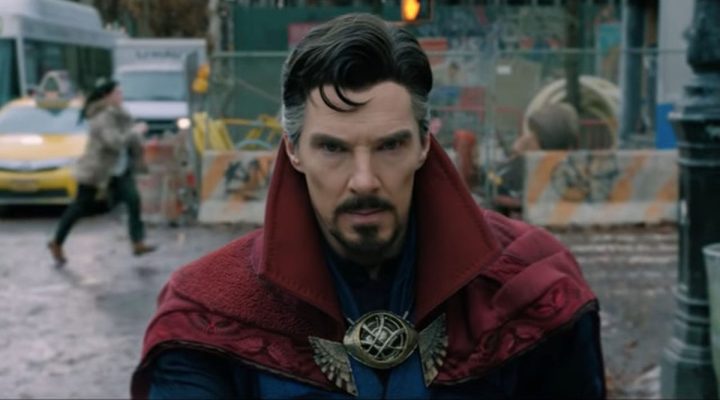What is it about Benedict Cumberbatch that audiences find so alluring? On a surface level, Cumberbatch is the perfect mix of unconventional and traditional good looks. He often gets compared to an otter, which both amuses and puzzles him. Many of his early roles exploited the peculiarity of his looks, whether it was Julian Assange in The Fifth State or All in Zoolander 2 — a performance that hasn’t aged particularly well. However, it would be a fool’s errand to deny Cumberbatch’s physical appeal. After all, he has numerous features considered conventionally attractive: Piercing blue eyes, a long and stylized face, and cheekbones that would make Marlene Dietrich jealous.
Still, Cumberbatch became a star not only for his good looks, but also for a combination of factors that made him irresistible to audiences. Cumberbatch is a star in every sense of the word: He’s electrifying on-screen, embodying his roles with an overwhelming intensity that brings chills down the spine. It’s no surprise that he often plays strong, one-of-a-kind characters that dominate their surroundings and stand out above the rest; Cumberbatch himself stands out from the Hollywood crowd. His résumé is full of layered and complex characters, troubled men who openly reject the traditional hero journey in favor of their own, more complicated path. Cumberbatch has redefined the modern antihero through his body of work, crafting a new kind of figure who audiences can love, hate, and everything in-between.
A high-functioning sociopath

Fans can trace Cumberbatch’s rapid rise to fame to 2010, when the BBC’s Sherlock premiered to critical acclaim. The actor had played significant roles in major projects like Atonement and The Other Boleyn Girl, but Sherlock was his ticket to stardom. The British detective was in the middle of a rebirth that began with Robert Downey Jr.’s 2009 film Sherlock Holmes. However, Cumberbatch’s take on Holmes was distinct and more than capable of standing on its own. His Sherlock was quick, witty, confident, and against all odds, charming.
What’s more, Cumberbatch didn’t try to be charming as Holmes, but he was. Whether it was his quick speech, unintentional hilarity, or random and overly toothy smiles, audiences were drawn in by his odd and intellectual appeal. Fans could easily understand why Molly was so smitten with him, despite his lack of empathy and occasional rudeness.
Sherlock became the prototype of a classic Cumberbatch character: He was bold, cunning, slightly manipulative, and highly antagonistic. He enjoyed teasing, sometimes playfully, sometimes not. Above all, Sherlock was intelligent, perceptive, observant, and undefeated in the art of investigating. Sherlock was superior, a trait shared by the majority of Cumberbatch’s most memorable roles. They might not necessarily be geniuses like Sherlock, but they’re all above the rest in one significant way or another. And Cumberbatch excels in these roles, bringing them to life with sincerity and gravitas. The actor has a unique gift for finding the vulnerability in the unyielding, emotion in stoicism, and humanity in the mechanical.
Sense, sensibility, and villainy

Cumberbatch rode the Sherlock wave throughout the early years of his career, playing a collection of characters that ranged from misunderstood rebels to outright villains. Franchises came calling, and Cumberbatch gave deliciously amoral performances in The Hobbit trilogy and Star Trek: Into Darkness. Even when the reception to the story was mixed — and there was certainly an outcry about Cumberbatch’s casting as Khan — critics couldn’t help but rave about Cumberbatch’s work. They used words like “steely,” “chilling,” and “intense,” suggesting he’s the sort of actor who audiences simply can’t ignore.
And that’s the truth. Cumberbatch is too overwhelming a presence to play the meek everyman roles made famous by someone like Hugh Grant. Take August: Osage County, where Cumberbatch plays the clumsy and unremarkable Little Charles Aiken. The actor does a fine job portraying Charles’ insecurities and fears, but he can’t help but stick out like a sore thumb. Perhaps it’s the unconvincing Southern accent or the overall quality of the role, but Cumberbatch feels awkward and out of place, not in the film’s domestic drama setting, but in Little Charles’ meaninglessness.
In comparison, the actor shines when playing the similarly behaved Alan Turing in Morten Tyldum’s The Imitation Game, a role that resulted in the actor’s first Oscar nomination. Cumberbatch’s Turing is odd and lacks experience and understanding regarding social relations, but can crack the Nazi code and outsmart most of his colleagues. Turing might be erratic and hard to understand, but he’s out of the ordinary, a man audiences root for despite everything that might suggest otherwise.
Reinventing the antihero

The Imitation Game was a game-changer for Cumberbatch’s career, taking him away from villainous roles and into a new stage in his career, where antiheroes would be the order of the day. He played Hamlet on the West End, Richard III in The Hollow Crown, and Thomas Edison in The Current War. However, his claim to the antihero throne would arrive in 2016 when he stepped into the cape of the Sorcerer Supreme.
Doctor Strange was a … well, strange addition to the MCU. The character was far from Marvel’s most famous; indeed, mainstream audiences in 2016 might not have been aware of his existence. Yet, the MCU was rapidly growing, and if it made a star out of B-listers like the Guardians of the Galaxy, anything was possible. Cumberbatch won the role after Joaquin Phoenix passed on it, entering the wave of superhero fever that defined the 2010s.
Stephen Strange is a prototypical Cumberbatch role: Vain, charming, experienced yet still learning, powerful but unaware of his full potential. Above all, Strange was one of the most unique heroes in a universe full of them. Whereas the MCU’s previous heroes came from suits of armor or scientific accidents, Doctor Strange got his powers from mysticism and legend. At that point, Wanda Maximoff’s powers were still a product of the Mind Stone, and the MCU had yet to establish her mystic credentials. Therefore, Strange was an island among the Avengers, unique in every way.
Over the next years, Cumberbatch’s Strange would return as a prominent supporting player in some of the best superhero movies of all time. From Avengers: Endgame to Spider-Man: No Way Home, Cumberbatch brought Strange’s superior ego and dry humor to the MCU, filling the sprawling universe with magic unlike anything fans had seen. Infinity War, in particular, showed Strange’s potential during his battle against Thanos. The sequence established the Doctor as one of the most powerful figures in the MCU and suggested great things to come for the then-Sorcerer Supreme.
The power of the Cumberbatch

Already at the apex of his career, Cumberbatch followed his MCU success with refreshing takes on established antiheroes. The next few years saw him voicing three of pop culture’s most beloved and popular antiheroes: The Grinch in Illumination’s film of the same name, Shere Khan in Andy Serkis’ underrated Mowgli: Legend of the Jungle, and Satan in Amazon’s unexpected hit Good Omens. He even voiced Severus Snape — a role he often gets fan-casted as — in an episode of The Simpsons, cementing his status as Hollywood’s go-to antihero.
Still, Cumberbatch kept finding ways to show the vulnerability in his troubled characters. Take Patrick Melrose, the 2018 five-part miniseries that cast Cumberbatch as a wealthy English playboy struggling with addiction. The actor opts for a cheery look at self-destruction, playing Melrose with sympathetic cruelty. The series itself is utterly ruthless in its portrayal of British upper society, and Cumberbatch isn’t afraid of conveying that sentiment. He is a tornado of emotions, going from anxiety to detachment, kindness to callousness, often in the same scene.
The actor adopted a similar approach for Jane Campion’s 2021 psychological drama The Power of the Dog. A revisionist Western that deconstructs the genre and the machismo upon which it stands, the film finds Cumberbatch giving arguably the performance of his career. Brutal and unforgiving, Cumberbatch fills his Phil Burbank with rage and self-loathing, fear and longing wrapped around a veil of false security. His work resulted in a richly deserved second Oscar nomination and cemented Cumberbatch as the British actor of his generation. The performance is contentious and hard to swallow, but when has that ever been a problem for Benedict Cumberbatch? His work is raw and honest, daring audiences to see beyond the surface and into the exposed layer of vulnerability where the truth lies.
Like the characters he plays, Benedict Cumberbatch is unique. Few actors have his range or willingness to experiment outside their comfort zones. Perhaps that’s Cumberbatch’s secret to success: His openness to explore the darkest sides of the human psyche with honesty and unflinching courage. Cumberbatch looks at the moral intricacies of his characters and welcomes them with open arms, finding beauty in the bleakest situations and the most disputable characters.
Benedict Cumberbatch isn’t here to please, and yet he almost always does. He’s an actor who will never play a romantic lead or a typical action man. That’s OK; we have enough of those. But we only have one Benedict Cumberbatch, and thank goodeness for him.



